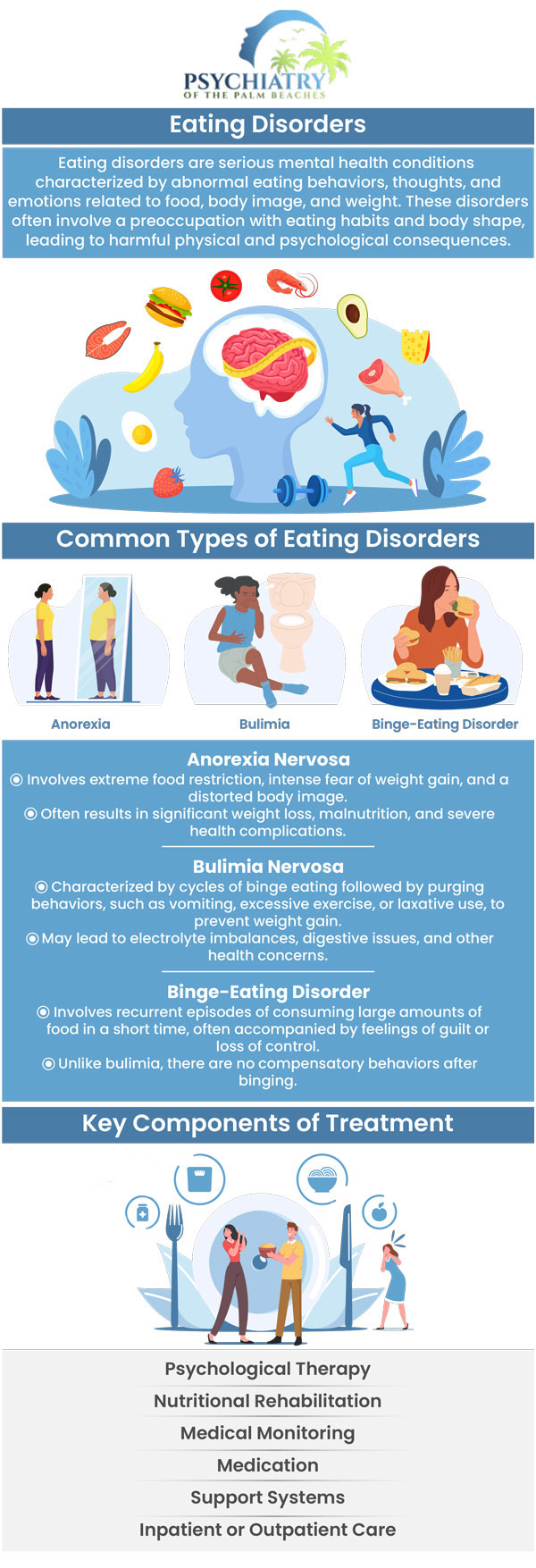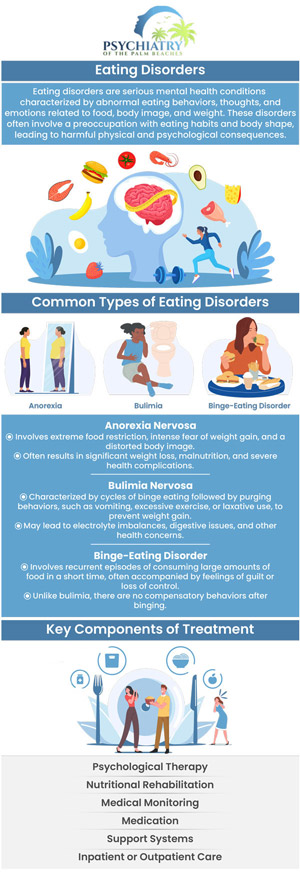Everything You Need To Know About Eating Disorders Q&A
An eating disorder is a medical condition in which a person is unable to maintain a balanced and healthy relationship with food. Depending on the condition, individuals may not eat enough, consume too much, or obsessively control the calories they take in or burn. Eating disorders are a severe issue that may affect both your emotional and physical health. If you suspect you have an eating disorder, don’t be embarrassed to seek treatment at Psychiatry of the Palm Beaches. For more information, contact us today or book an appointment online. Visit Psychiatry of the Palm Beaches serving Jacksonville, Boynton Beach, Palm Beach Gardens, Stuart, Royal Palm Beach, Port St. Lucie, Melbourne, Fort Lauderdale, and Jupiter, FL.




Table of Contents:
What is an eating disorder?
What is the main characteristic of the eating disorder anorexia nervosa?
What are the types of eating disorders?
An eating disorder is a serious behavioral condition defined by unhealthy habits, thought patterns, and/or emotions related to eating. They can be characterized by an individual’s relationship with food, body weight, or body shape. There are many types of eating disorders capable of affecting physical and mental health.
The many different types of eating disorders mean these conditions manifest with a range of signs and symptoms; however, they are focused on issues relating to food. Eating disorders can affect how an individual feels, thinks, and behaves. They can have adverse impacts on mental and physical health, and they can also be brought on by mental or physical health conditions. For instance, eating disorders are linked with depression and anxiety, which can either lead to or be caused by creating a vicious cycle of mental turmoil.
Eating disorders vary in severity; however, when left untreated, many can pose serious health risks. With extreme eating patterns, be they overeating or not eating enough, individuals are likely to experience struggles with getting the nutrients they need, fatigue, disrupted sleep patterns, lack of energy, and much more. Over time, poor eating habits can lead to several physical health problems, such as issues with the heart, bones, digestive system, teeth, and more.
Fortunately, several treatment options are available at Psychiatry of the Palm Beaches. Treatments for eating disorders vary according to the nature of the condition and other individual considerations. However, they most commonly involve a combination of talk or behavioral therapy and medication.
Anorexia nervosa, commonly known as anorexia, is characterized by an obsession with weight, body image, and food. Individuals with anorexia nervosa have an intense fear of gaining weight and a distorted perception of their body weight. They pursue an avoidance of gaining weight to extreme ends of food abstinence that leads to health issues and can interfere with their physical, mental, and social well-being.
The atypical eating patterns of an individual with anorexia nervosa may be employed to attempt to cope with low self-esteem, anxiety, and stress, and in other cases, their dieting may give them a feeling of control over their lives.
Individuals with this condition may attempt to limit their calorie intake through several drastic measures, such as diet aids, forced vomiting, diuretics, laxatives, and more. Regardless of their weight loss or how little they weigh, they are unlikely to be satisfied due to their distorted self-image. Their extreme weight loss may be accompanied by symptoms such as fatigue, trouble sleeping, dehydration, low blood pressure, thinning hair, irregular heart rhythms, and more. If left untreated, anorexia nervosa is associated with a wide range of health risks.
Eating disorders describe a wide range of conditions characterized by an individual’s relationship with food or their body. They can involve eating too little or too much. Any type can cause serious mental or physical health problems without treatment. Many eating disorders develop during childhood or adolescence; however, they can impact individuals of all ages.
Anorexia nervosa is among the most common eating disorders. Avoidant/restrictive food intake disorder is another disorder characterized by eating too little, although these habits are the result of distaste or lack of interest in food rather than body image issues.
Bulimia nervosa and binge eating disorder are both characterized by excess food consumption. Regardless of the nature of the eating disorder, treatment interventions are available. Through a tailored treatment plan, the specialists at Psychiatry of the Palm Beaches can help individuals take control of their eating disorders, improving health outcomes.
Comprehensive Insights Into Eating Disorders With Our Team
Our team offers comprehensive insights into how eating disorders affect not only the body but also mood, relationships, and daily functioning. Through supportive conversations at Psychiatry of the Palm Beaches, he helps individuals understand the cycle of negative thoughts and behaviors that keep these conditions going. This deeper understanding becomes a powerful tool in breaking unhealthy patterns.
Eating disorders can be treated. Untreated eating disorders can lead to serious problems. Eating disorder treatment is available at Psychiatry of the Palm Beaches. For more information, contact us today or book an appointment online. We serve patients from Boynton Beach FL, Delray Beach FL, Palm Beach Gardens FL, Jupiter FL, Stuart FL, Palm City FL, Royal Palm Beach FL, Wellington FL, Citrus Ridge FL, Jacksonville FL, Riverside FL, Port St. Lucie FL, Beau Rivage West FL, Melbourne FL, Palm Bay FL, Fort Lauderdale FL, Hollywood FL, Jupiter FL, North Palm Beach FL, and surrounding areas.
Check Out Our 5 Star Reviews



Additional Services You May Need
▸ Mental Wellness
▸ Relationship Coaching
▸ Depression and Mood Disorders
▸ Women’s Health
▸ Panic Disorder
▸ Medications Management
▸ Men’s Health
▸ Individual Psychotherapy
▸ Bipolar
▸ ADHD
▸ Geriatric Mental Health
▸ Couple’s Counseling
▸ Obsessive Compulsive Disorder
▸ Social Phobia Treatment
▸ Eating Disorders
▸ Post Traumatic Stress Disorder
▸ Psychotic Disorders


